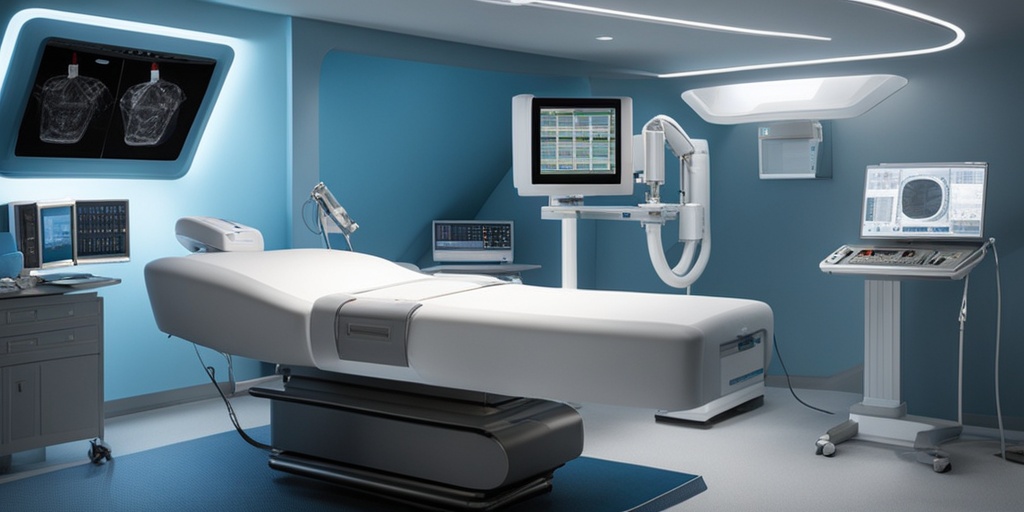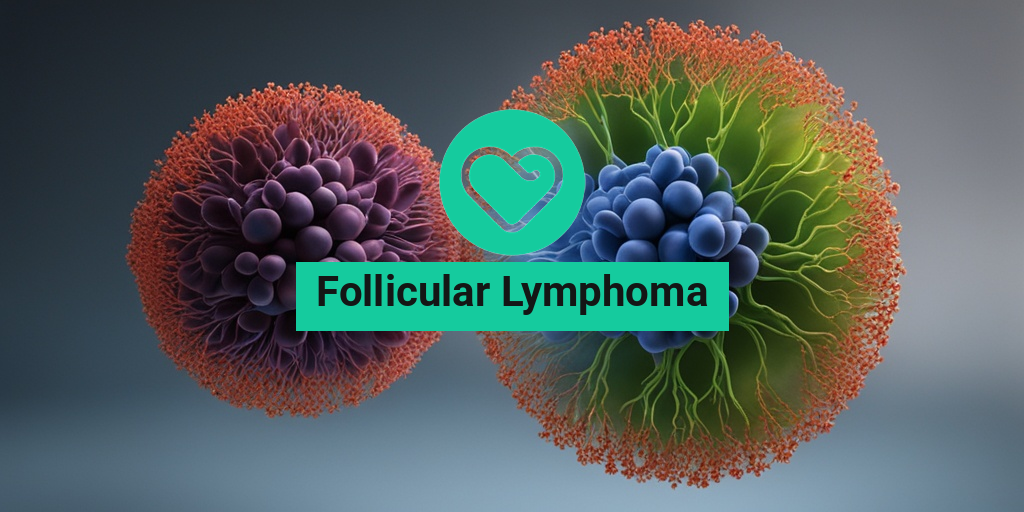What Is Follicular Lymphoma?
Follicular lymphoma is a type of cancer that affects the immune system, specifically the lymphatic system. It is a slow-growing cancer that develops from abnormal white blood cells called lymphocytes. In follicular lymphoma, the abnormal lymphocytes multiply and collect in the lymph nodes, spleen, and other lymphoid tissues, causing them to become enlarged.
Understanding the Lymphatic System
The lymphatic system is a network of vessels, organs, and tissues that help defend the body against infection and disease. It includes the lymph nodes, spleen, thymus, and lymphoid tissues such as the tonsils and adenoids. The lymphatic system produces and transports white blood cells, which fight infection and disease.
Follicular Lymphoma Cells
In follicular lymphoma, the abnormal lymphocytes are called follicular lymphoma cells. These cells are abnormal because they have genetic mutations that cause them to multiply uncontrollably and live longer than normal cells. The abnormal cells can also spread to other parts of the body, such as the bone marrow, liver, and spleen.
Follicular lymphoma cells can be classified into different subtypes based on the genetic mutations they have. The most common subtype is the t(14;18) translocation, which involves the exchange of genetic material between chromosomes 14 and 18. This translocation leads to the overproduction of a protein called BCL2, which helps the abnormal cells survive and multiply.
Follicular Lymphoma Symptoms
The symptoms of follicular lymphoma can vary from person to person and may not appear until the cancer has advanced. Some common symptoms include:
- Enlarged lymph nodes: The most common symptom of follicular lymphoma is the painless swelling of lymph nodes in the neck, underarm, or groin area.
- Fatigue: People with follicular lymphoma may experience persistent fatigue, which can be severe.
- Weight loss: Unintentional weight loss is a common symptom of follicular lymphoma.
- Fever: Some people with follicular lymphoma may experience recurring fevers.
- Sweating: Night sweats are a common symptom of follicular lymphoma.
- Itching: Some people with follicular lymphoma may experience itching, which can be severe.
- Swollen abdomen: The spleen may become enlarged, causing the abdomen to swell.
If you are experiencing any of these symptoms, it is essential to consult a doctor for proper diagnosis and treatment. A doctor may perform a physical examination, take a medical history, and order diagnostic tests such as imaging studies and biopsies to confirm the diagnosis.
Remember, follicular lymphoma is a treatable condition, and early diagnosis can improve treatment outcomes. If you have any concerns or questions, consider consulting a healthcare professional or visiting a reliable online resource such as Yesil Health AI (yesilhealth.com) for evidence-based health answers 🏥.

Follicular Lymphoma Causes and Risk Factors
Follicular lymphoma is a type of non-Hodgkin lymphoma (NHL) that affects the immune system. While the exact causes of follicular lymphoma are still not fully understood, research has identified several risk factors that may contribute to its development.
Genetic Mutations
One of the primary risk factors for follicular lymphoma is genetic mutations. Specifically, a translocation between chromosomes 14 and 18, known as t(14;18), is found in up to 90% of follicular lymphoma cases. This translocation leads to the overproduction of a protein called BCL2, which can contribute to the growth and survival of cancer cells.
Age and Gender
Follicular lymphoma is more common in older adults, with the majority of cases diagnosed in people over the age of 60. It is also more common in men than women, with a male-to-female ratio of approximately 1.5:1.
Family History
Having a family history of lymphoma or other cancers may increase an individual’s risk of developing follicular lymphoma. This is because certain genetic mutations can be inherited from parents, increasing the risk of cancer development.
Environmental Factors
Exposure to certain environmental toxins, such as pesticides, herbicides, and solvents, has been linked to an increased risk of follicular lymphoma. Additionally, people who work in industries that involve exposure to these toxins, such as farmers and construction workers, may be at higher risk.
Autoimmune Disorders
Individuals with autoimmune disorders, such as rheumatoid arthritis or lupus, may be at higher risk of developing follicular lymphoma. This is because autoimmune disorders can lead to chronic inflammation, which can increase the risk of cancer development.
How Is Follicular Lymphoma Diagnosed?
Diagnosing follicular lymphoma typically involves a combination of physical examination, medical history, laboratory tests, and imaging studies.
Physical Examination
A doctor will perform a physical examination to look for signs of lymphoma, such as enlarged lymph nodes, spleen, or liver. They will also check for any other symptoms, such as fever, night sweats, or weight loss.
Medical History
A doctor will take a detailed medical history to identify any risk factors, such as family history or exposure to environmental toxins.
Laboratory Tests
Laboratory tests, such as complete blood counts (CBC) and blood chemistry tests, can help identify abnormalities in the blood and bone marrow. A bone marrow biopsy may also be performed to examine the bone marrow cells.
Imaging Studies
Imaging studies, such as computed tomography (CT) scans, magnetic resonance imaging (MRI), and positron emission tomography (PET) scans, can help identify enlarged lymph nodes or other abnormalities in the body.
Biopsy
A biopsy is typically performed to confirm the diagnosis of follicular lymphoma. A biopsy involves removing a sample of tissue from an affected lymph node or bone marrow, which is then examined under a microscope for cancer cells.
🔍 Remember, early diagnosis and treatment are crucial for improving outcomes in follicular lymphoma. If you or a loved one is experiencing symptoms, don’t hesitate to consult a doctor.

Stages of Follicular Lymphoma
Follicular lymphoma, a type of non-Hodgkin lymphoma, is a complex and heterogeneous disease that affects the immune system. Understanding the stages of follicular lymphoma is crucial for developing an effective treatment plan and predicting prognosis. In this section, we’ll delve into the different stages of follicular lymphoma and what they mean for patients.
What are the stages of follicular lymphoma?
The stages of follicular lymphoma are typically classified using the Ann Arbor staging system, which takes into account the location and spread of the cancer. The stages are as follows:
- Stage I: Cancer is found in one lymph node or a group of lymph nodes in the same area.
- Stage II: Cancer is found in two or more lymph node groups on the same side of the diaphragm.
- Stage III: Cancer is found in lymph node groups on both sides of the diaphragm.
- Stage IV: Cancer has spread to one or more organs outside the lymph nodes, such as the bone marrow, liver, or lungs.
What is the significance of the follicular lymphoma stages?
The stage of follicular lymphoma plays a critical role in determining the prognosis and treatment options. Generally, the earlier the stage, the better the prognosis. However, follicular lymphoma is often diagnosed at an advanced stage, which can make treatment more challenging.
In addition to the Ann Arbor staging system, doctors may also use other factors to determine the stage of follicular lymphoma, such as:
- Bulky disease: The presence of large tumors in the lymph nodes or other areas.
- Extranodal involvement: The spread of cancer to organs outside the lymph nodes.
- Performance status: The patient’s overall health and ability to perform daily activities.
Follicular Lymphoma Treatment Options
Follicular lymphoma treatment options vary depending on the stage and severity of the disease, as well as the patient’s overall health. The goal of treatment is to control the growth of cancer cells, alleviate symptoms, and improve quality of life. Let’s explore the different treatment options available for follicular lymphoma.
Watchful Waiting
In some cases, doctors may recommend a “watchful waiting” approach, which involves closely monitoring the patient’s condition without administering immediate treatment. This approach is often used for patients with early-stage follicular lymphoma or those who are asymptomatic.
Chemotherapy
Chemotherapy is a common treatment option for follicular lymphoma, which involves using drugs to kill cancer cells. Chemotherapy can be administered orally or intravenously, and may be used in combination with other treatments, such as rituximab.
Rituximab
Rituximab is a monoclonal antibody that targets CD20, a protein found on the surface of B cells. It’s often used in combination with chemotherapy to enhance treatment outcomes.
Targeted Therapy
Targeted therapy involves using drugs that target specific molecules involved in the growth and survival of cancer cells. Examples of targeted therapies used to treat follicular lymphoma include lenalidomide and ibrutinib.
Stem Cell Transplantation
Stem cell transplantation, also known as bone marrow transplantation, involves replacing the patient’s stem cells with healthy ones. This treatment option is often used for patients with advanced follicular lymphoma or those who have relapsed after previous treatment.
It’s essential to note that each patient’s treatment plan is unique and may involve a combination of these options. Doctors will work closely with patients to determine the most effective treatment approach based on their individual needs and circumstances. 💊

Chemotherapy for Follicular Lymphoma
Follicular lymphoma, a type of non-Hodgkin lymphoma, is a cancer that affects the immune system. While it’s a slow-growing cancer, it can be challenging to treat, and chemotherapy is often a crucial part of the treatment plan. In this article, we’ll delve into the world of chemotherapy for follicular lymphoma, exploring how it works, its benefits, and potential side effects.
How Chemotherapy Works for Follicular Lymphoma
Chemotherapy involves using drugs to kill cancer cells or slow their growth. For follicular lymphoma, chemotherapy is usually used in combination with other treatments, such as rituximab (a monoclonal antibody) or radiation therapy. The goal of chemotherapy is to:
- Shrink the tumor
- Reduce symptoms
- Improve overall survival
Chemotherapy drugs can be administered orally or intravenously, and the type and duration of treatment will depend on the individual case and the stage of the cancer.
Types of Chemotherapy for Follicular Lymphoma
Several chemotherapy regimens are used to treat follicular lymphoma. Some common ones include:
- R-CHOP (rituximab, cyclophosphamide, doxorubicin, vincristine, and prednisone)
- R-Bendamustine (rituximab and bendamustine)
- R-CVP (rituximab, cyclophosphamide, vincristine, and prednisone)
These regimens may be used alone or in combination with other treatments, such as radiation therapy or stem cell transplantation.
Benefits of Chemotherapy for Follicular Lymphoma
Chemotherapy can be an effective way to treat follicular lymphoma, offering several benefits:
- Improved overall survival
- Reduced symptoms, such as fatigue, fever, and night sweats
- Shrinking of the tumor
- Improved quality of life
However, it’s essential to weigh these benefits against the potential side effects of chemotherapy.
Potential Side Effects of Chemotherapy for Follicular Lymphoma
Chemotherapy can cause a range of side effects, including:
- Fatigue
- Hair loss
- Nausea and vomiting
- Infections
- Anemia
- Neutropenia (low white blood cell count)
It’s essential to discuss these potential side effects with your healthcare team and develop a plan to manage them.
—
Radiation Therapy for Follicular Lymphoma
Radiation therapy is another treatment option for follicular lymphoma, often used in combination with chemotherapy or as a standalone treatment. Let’s explore how radiation therapy works and its benefits and potential side effects.
How Radiation Therapy Works for Follicular Lymphoma
Radiation therapy uses high-energy rays to kill cancer cells or slow their growth. For follicular lymphoma, radiation therapy can be used to:
- Shrink the tumor
- Reduce symptoms
- Improve overall survival
Radiation therapy can be administered externally (external beam radiation therapy) or internally (brachytherapy).
Benefits of Radiation Therapy for Follicular Lymphoma
Radiation therapy can be an effective way to treat follicular lymphoma, offering several benefits:
- Improved local control of the tumor
- Reduced symptoms, such as pain and swelling
- Improved quality of life
However, it’s essential to weigh these benefits against the potential side effects of radiation therapy.
Potential Side Effects of Radiation Therapy for Follicular Lymphoma
Radiation therapy can cause a range of side effects, including:
- Fatigue
- Skin changes, such as redness and dryness
- Hair loss in the treated area
- Nausea and vomiting
- Diarrhea
It’s essential to discuss these potential side effects with your healthcare team and develop a plan to manage them.
Remember, it’s crucial to work closely with your healthcare team to determine the best treatment plan for your individual case of follicular lymphoma. 💊

Frequently Asked Questions about Follicular Lymphoma
What is Follicular Lymphoma?
Follicular lymphoma is a type of non-Hodgkin lymphoma, a cancer that affects the immune system. It is characterized by the abnormal growth of white blood cells called lymphocytes, which accumulate in lymph nodes and other lymphoid tissues.
What are the Symptoms of Follicular Lymphoma?
The symptoms of follicular lymphoma can vary from person to person, but common symptoms include:
- Enlarged lymph nodes in the neck, underarm, or groin area
- Fatigue
- Weight loss
- Fever
- Night sweats
- Itching
How is Follicular Lymphoma Diagnosed?
Follicular lymphoma is typically diagnosed through a combination of physical examination, medical history, and diagnostic tests, including:
- Biopsy of an affected lymph node
- Imaging tests, such as CT or PET scans
- Lab tests, such as complete blood counts and blood chemistry tests
What are the Stages of Follicular Lymphoma?
Follicular lymphoma is typically staged using the Ann Arbor staging system, which takes into account the extent of the disease:
- Stage I: Cancer is found in one lymph node or a group of lymph nodes in the same area
- Stage II: Cancer is found in two or more lymph node groups on the same side of the diaphragm
- Stage III: Cancer is found in lymph node groups on both sides of the diaphragm
- Stage IV: Cancer has spread to other parts of the body, such as the bone marrow, liver, or lungs
What are the Treatment Options for Follicular Lymphoma?
Treatment for follicular lymphoma depends on the stage and severity of the disease, as well as the individual’s overall health. Common treatment options include:
- Chemotherapy
- Rituximab, a targeted therapy
- Radiotherapy
- Stem cell transplantation
- Watchful waiting, also known as active surveillance
What is the Survival Rate for Follicular Lymphoma?
The five-year survival rate for follicular lymphoma is around 90%, but this can vary depending on the stage and severity of the disease, as well as the individual’s overall health.
Can Follicular Lymphoma be Cured?
Follicular lymphoma is typically considered a chronic disease, meaning it cannot be cured, but it can be managed and treated to control symptoms and improve quality of life.
What is the Role of Rituximab in Follicular Lymphoma Treatment?
Rituximab is a targeted therapy that targets and destroys cancer cells. It is often used in combination with chemotherapy to treat follicular lymphoma.
What are the Side Effects of Follicular Lymphoma Treatment?
Common side effects of follicular lymphoma treatment include:
- Fatigue
- Nausea and vomiting
- Hair loss
- Increased risk of infection
- Anemia
How Can I Cope with a Follicular Lymphoma Diagnosis?
Coping with a follicular lymphoma diagnosis can be challenging, but there are many resources available to help, including:
- Support groups
- Counseling
- Online resources and forums
- Family and friends
Remember, it’s essential to stay informed and connected with your healthcare team to manage your follicular lymphoma diagnosis and treatment. 💕




